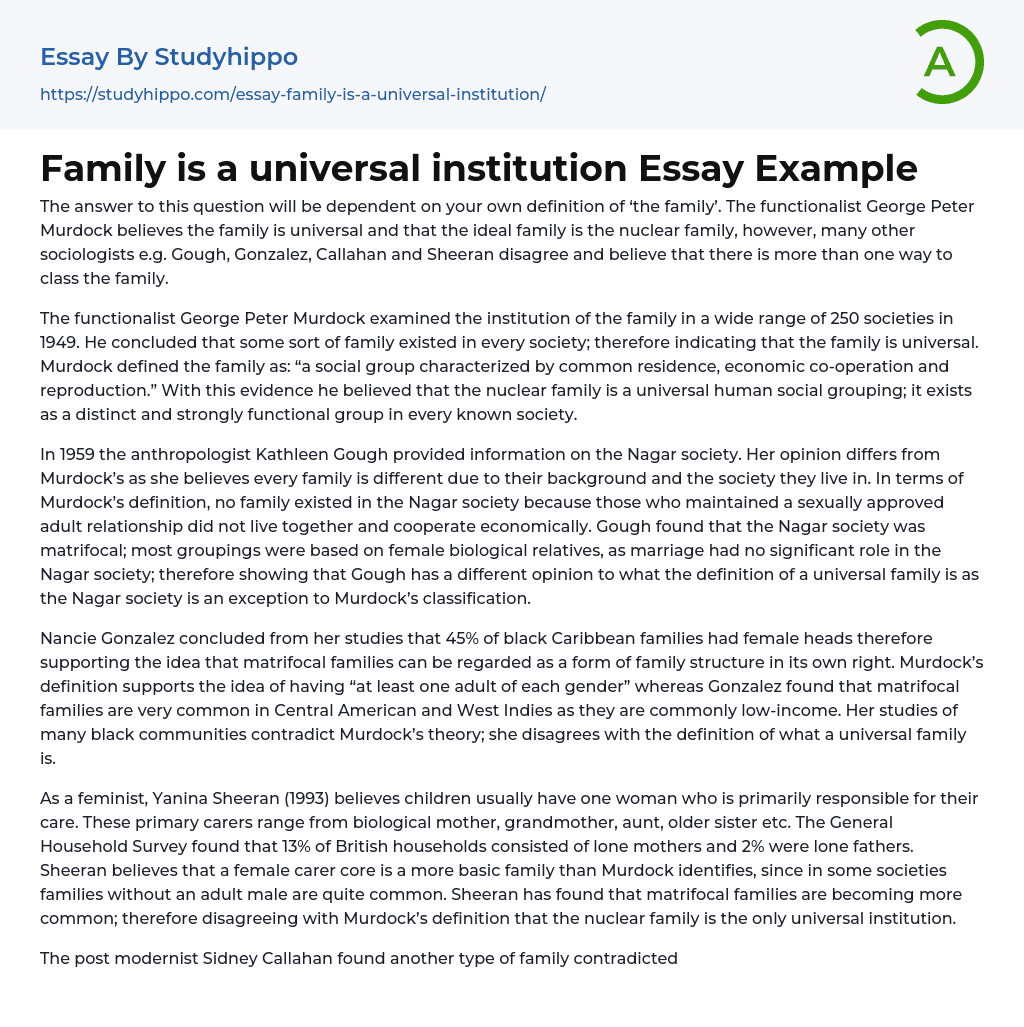The answer to this question will be dependent on your own definition of ‘the family’. The functionalist George Peter Murdock believes the family is universal and that the ideal family is the nuclear family, however, many other sociologists e.g. Gough, Gonzalez, Callahan and Sheeran disagree and believe that there is more than one way to class the family.
The functionalist George Peter Murdock examined the institution of the family in a wide range of 250 societies in 1949. He concluded that some sort of family existed in every society; therefore indicating that the family is universal. Murdock defined the family as: “a social group characterized by common residence, economic co-operation and reproduction.” With this evidence he believed that the nuclear family is a universal human social grouping; it exists as a distinct and strongly functional group i
...n every known society.
In 1959 the anthropologist Kathleen Gough provided information on the Nagar society. Her opinion differs from Murdock’s as she believes every family is different due to their background and the society they live in. In terms of Murdock’s definition, no family existed in the Nagar society because those who maintained a sexually approved adult relationship did not live together and cooperate economically. Gough found that the Nagar society was matrifocal; most groupings were based on female biological relatives, as marriage had no significant role in the Nagar society; therefore showing that Gough has a different opinion to what the definition of a universal family is as the Nagar society is an exception to Murdock’s classification.
Nancie Gonzalez concluded from her studies that 45% of black Caribbean families had female heads
therefore supporting the idea that matrifocal families can be regarded as a form of family structure in its own right. Murdock’s definition supports the idea of having “at least one adult of each gender” whereas Gonzalez found that matrifocal families are very common in Central American and West Indies as they are commonly low-income. Her studies of many black communities contradict Murdock’s theory; she disagrees with the definition of what a universal family is.
As a feminist, Yanina Sheeran (1993) believes children usually have one woman who is primarily responsible for their care. These primary carers range from biological mother, grandmother, aunt, older sister etc. The General Household Survey found that 13% of British households consisted of lone mothers and 2% were lone fathers. Sheeran believes that a female carer core is a more basic family than Murdock identifies, since in some societies families without an adult male are quite common. Sheeran has found that matrifocal families are becoming more common; therefore disagreeing with Murdock’s definition that the nuclear family is the only universal institution.
The post modernist Sidney Callahan found another type of family contradicted Murdock’s theory: gay and lesbian families. Similar to lone-parent families, households with gay parents are seen by some to not be ‘proper families’. Callahan found that 1,000 children were born into gay and lesbian couples in San Francisco between 1985-1990 therefore showing that even though the statistics are reasonably low they do exist. He argues that gay or lesbian families (with children) should be regarded as a type of family at least where the relationship of the parents is intended to be permanent. This therefore opposes Murdock’s
theory, as Callahan believes that the family does not have to be nuclear to be universal.
For a family to be categorised as universal entirely depends on how ‘the family’ is defined. Domestic arrangements differ from that of the ‘conventional’ family. As there are so many types of household it is difficult to create a single definition of ‘the family’ therefore it makes it harder to define what is meant by a ‘universal family’.
- Home essays
- Dog essays
- Adoption essays
- Babies essays
- Children essays
- Love essays
- Parenting Teens essays
- Wedding essays
- Wife essays
- Aunt essays
- Daughter essays
- Parents essays
- Sister essays
- Foster Care essays
- Sibling essays
- Father essays
- Grandparent essays
- Mother essays
- Caring essays
- Dysfunctional Family essays
- Bedroom essays
- Room essays
- Relationship essays
- Jealousy essays
- Friends essays
- Online Dating essays
- Divorce essays
- Husband essays
- Marriage essays
- Hometown essays
- Parenting essays
- Family Tradition essays
- Family Values essays
- Baby Clothes essays
- Child essays
- Childcare essays
- Child labor essays
- Doll essays
- Walls essays
- Appreciation essays
- Single Parent essays
- Single Parenting essays
- Culture essays
- Social Control essays
- Citizenship essays
- Social Justice essays
- Caste System essays
- Social Responsibility essays
- Socialization essays
- Deviance essays




